|
|
|
Sort Order |
|
|
|
Items / Page
|
|
|
|
|
|
|
| Srl | Item |
| 1 |
ID:
092909
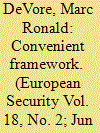

|
|
|
|
|
| Publication |
2009.
|
| Summary/Abstract |
One important discussion about European security focuses on what types of institutions will enable Europe to effectively intervene in regional crises. Thus far, the consensus has been that a European Security and Defense Policy should possess, for its military component, a highly institutionalized and integrative inter-governmental structure. Ironically, Europe's greatest collective foreign military successes were obtained under the organizational auspices of the Western European Union (WEU), whose ill-defined mandate and weak institutional structures contrast markedly from current policy prescriptions. In two campaigns, the WEU coordinated efforts to protect maritime commerce and swept sea lanes for naval mines during the Iran-Iraq War (1987-1988), enforced the United Nations embargo of Iraq during the 1990-1991 Gulf Crisis, and cleared the naval mines left behind after the 1991 Gulf War. The lesson to be drawn from these successful interventions is that Europe profited from a structure capable of limiting the political and diplomatic costs of intervening abroad and not, as is often assumed, an organization designed to maximize military efficiency.
|
|
|
|
|
|
|
|
|
|
|
|
|
|
|
|
| 2 |
ID:
092903
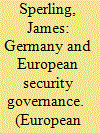

|
|
|
|
|
| Publication |
2009.
|
| Summary/Abstract |
The expansion of the security agenda after the end of the Cold War, propelled by the blowback of 11 September 2001, raises questions about the German ability and willingness to contribute to the regional and global security governance tasks facing Europe and Germany's continuing fidelity to its post-war European avocation. It also calls for a reconsideration of the Birmingham model of foreign policy analysis, particularly its emphasis on (and interpretation of) the ideational and institutional factors defining the German foreign policy agenda and shaping German foreign policy behaviour, at least with respect to the implementation (rather than formulation) of European Union security policies. Towards assessing the continuing utility of the Birmingham model, this article proceeds in three steps: the presentation of the Birmingham model and its restatement as six conjectures; a discussion of the security governance functions undertaken by the EU and the collective action problem facing Europe (and Germany) in executing them; and an empirical investigation of Germany's contribution to the EU as a security actor since 1990.
|
|
|
|
|
|
|
|
|
|
|
|
|
|
|
|
| 3 |
ID:
092901
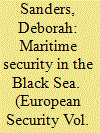

|
|
|
|
|
| Publication |
2009.
|
| Summary/Abstract |
The Black Sea is bordered by three NATO members: Bulgaria, Romania and Turkey, as well as Ukraine, Russia and Georgia and it faces a number of maritime security threats that affect European security. These include direct threats to ships, shipping and maritime personnel as well as threats from the way in which the Black Sea is used for illegal activities by criminals and terrorists. This paper argues that despite the acceptance by NATO that regional maritime security operation performed by littoral states will provide a safe and secure maritime environment in the Black Sea, these serious maritime threats cannot be dealt with effectively by the littoral states. Poor relations between littoral states and lack of investment in maritime capabilities suggest that maritime security cannot be achieved in the Black Sea in the short to medium term. Instead, Black Sea will continue to be a major source of insecurity and instability for Europe.
|
|
|
|
|
|
|
|
|
|
|
|
|
|
|
|
| 4 |
ID:
092904
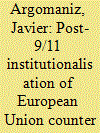

|
|
|
|
|
| Publication |
2009.
|
| Summary/Abstract |
This article applies a historical institutionalist perspective to an empirical analysis of the sources and characteristics of the institutionalisation of European Union counter-terrorism. Drawing upon the work of Stone Sweet, Sandholtz and Fligstein, this paper critically analyses the impact of external crises in the form of major terrorist attacks on the emergence of counter-terrorism as an area of European governance. It also highlights the key policy and institutional developments, studies the role of policy innovators on the institutionalisation of counter-terrorism and supports the relevance of 'transformative' or 'evolutionary' models for the understanding of institutional change in this domain.
|
|
|
|
|
|
|
|
|
|
|
|
|
|
|
|
| 5 |
ID:
092906
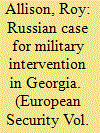

|
|
|
|
|
| Publication |
2009.
|
| Summary/Abstract |
The Russian military intervention in Georgia in August 2008 has raised significant questions about Russian thinking and practice on the legitimate use of military force abroad, especially in relation to neighbour states. The arguments advanced by Russia to justify this campaign show how Russian interpretations of customary international law as well as norms related to the use of force have served as an instrument of state policy, rather than being rooted in any broader international consensus. The Russian discourse in this context about sovereignty, self-determination and the legitimacy of recognising South Ossetia and Abkhazia as states appears similarly to be strongly influenced by political self-interest and Russian views about its entitlement within the Commonwealth of Independent States (CIS) region. Among Russian claims, Moscow's commitment to support its 'citizens' abroad has been particularly controversial. This article examines these issues and also the possibility that, through its justifications for waging war against Georgia, Russia is more broadly contesting the interpretation of certain international norms, that it regards as essentially constructed by Western states. Some potential implications of these legal and normative arguments for future Russian policy in the CIS region, including Ukraine, are also examined.
|
|
|
|
|
|
|
|
|
|
|
|
|
|
|
|
| 6 |
ID:
092907


|
|
|
|
|
| Publication |
2009.
|
| Summary/Abstract |
This paper considers the present condition and future prospects for post-Strategic Arms Reduction Treaty (post-START) nuclear arms reductions in the following sequence. First, we review the essential features of the agreement between Obama and Russian President Dmitri Medvedev in July 2009, for a START follow-on agreement. Second, we discuss the larger political and military-strategic contexts within which these post-START negotiations will play out. Third, we perform an analysis to determine whether the START follow-on guidelines would meet prospective requirements for mutual deterrence and, in addition, whether US-Russian reductions could safely go even lower. Fourth, we take a specific look at the estimated impact of defenses on deterrence stability under post-START reductions. Fifth, pertinent conclusions are summarized.
|
|
|
|
|
|
|
|
|
|
|
|
|
|
|
|
|
|
|
|
|